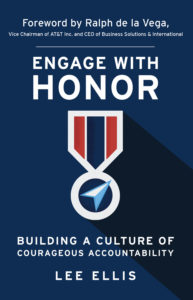If I had to use a single word to describe what characterizes a U.S. serviceman or servicewoman it would probably be honor.
To me, honor stands for integrity, courage, loyalty and trust.
Those are the traits that define the people who put their life on the line to protect our country and our way of life—and whose sacrifice we recognize today.
Honor in leadership
These are the same traits that business leaders ought to embody if they expect to be respected by their teams.
I can’t think of many individuals who can write more authentically about honor in leadership than Col. Leon “Lee” Ellis, USAF (Ret).
I’ve known Lee for a number of years and admire what he has done to turn a very difficult experience into a lesson that leaders everywhere can benefit from.
I recently invited him to come to AT&T’s headquarters in Dallas to talk to employees live and via webcast.
Watching leaders lead at the “Hanoi Hilton”
In 1969, Lee was a 24-year-old Air Force pilot flying missions over Vietnam when his plane was shot down. He was captured and imprisoned at the infamous Hỏa Lò Prison—the so-called “Hanoi Hilton.” Lee and three other men were crammed into a 6.5 x 7 foot cell. He spent 1955 days in captivity. If you do the math, that’s 5 years and 4 months.
As one of the junior officers, Lee watched his senior POW leaders—including future US Senator John McCain[i]—endure the toughest conditions, including pain, isolation and torture with honor, without once giving in to the enemy.
By doing that, these senior leaders taught an important leadership lesson to the younger POWs like Lee.
“Leaders go first,” he said. “As a follower, hard choices were much easier when you saw your leaders setting the example,” he said.
Honor in business leadership
I tell people that what defines you as an individual is not where you start but where you end and how you overcome the obstacles you encounter in life and turn them to advantage.
Lee is a perfect example of that.
He took the valuable leadership lessons learned in his captivity and military career and applied them to his post-military career as a leadership consultant, coach, author and speaker.
Lee laid out the foundation of his leadership philosophy in his first book, Leading with Honor (May 2012). In this new book, Engage with Honor[ii] (Sept. 2016), Lee expands the concept of honor in leadership and draws on his POW experiences to introduce a model that business leaders can use to build a culture of what he calls Courageous Accountability.
 “Probably one of the most important things I can say to you today is that leaders are role models,” Lee told the AT&T audience. “If you’re a leader who embodies character, courage and commitment, your people will want to be like you. You have influence over your people.”
“Probably one of the most important things I can say to you today is that leaders are role models,” Lee told the AT&T audience. “If you’re a leader who embodies character, courage and commitment, your people will want to be like you. You have influence over your people.”
Accountability: the leader owns it
I asked Lee to expand on the concept of accountability.
“The leader owns it. If you’re not being accountable to your duty, to your responsibilities, to ethics, you can’t expect other people to be accountable. And you don’t have the credibility to hold them accountable.”
“I believe than 95% or more of the population wants to be successful, wants to do a good job, and what they need from you and me is to be the leaders, to help them. So if we work with them, and help them, make sure they know what to expect, we’re going to connect with their hearts, help them to feel valued, that what they’re doing is important, if you do that they’re going to jump on it and go for it.”
The leader’s legacy
Passing the torch of honorable leadership is becoming more important for businesses as 80 million millennials assume leadership roles quicker than ever before.
“Our legacy is to pass the torch of honor and accountability,” says Lee. “If you serve in any capacity as a leader, then you have the responsibility and privilege of showing the way for others. Engage with them and be honest. Millennials love authenticity. If you’re authentic, and you’re working with them, they’re going to enjoy working with you and you’ll be preparing the next generation.”
I couldn’t agree more.
Ralph
[i] John McCain was captured 11 days before Lee Ellis. They returned home on the same airplane.
[ii] I had the honor to write the Foreword to Lee’s second book.



